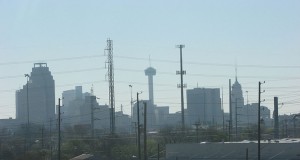Posts Tagged ‘San Antonio’
Gas Patch Pollution Linked to First Alamo City Ozone Violation
 Ever since smog was an issue in Texas starting in the last 1980's, the two largest metropolitan areas have been duking it out for worst air in the state. Houston was the undisputed champion for awhile, but as of the last couple of years, Dallas-Ft. Worth has been neck and neck, and last, year, even posted worse numbers than Bayou City. No other city even came close.
Ever since smog was an issue in Texas starting in the last 1980's, the two largest metropolitan areas have been duking it out for worst air in the state. Houston was the undisputed champion for awhile, but as of the last couple of years, Dallas-Ft. Worth has been neck and neck, and last, year, even posted worse numbers than Bayou City. No other city even came close.
Until now.
For the first time ever, San Antonio has a monitor in violation of the national ozone standard. It's the new standard of 75 parts per billion, so it's still way ahead of Houston and Ft. Worth that are still have chronic problems meeting the old 1997 85 ppb standard. But it's still a milestone.
What factors helped push SA over the line? Well, theres the significant growth of the larger metropolitan area itself, and out-of-state power plants that will now not be better controlled because of Team Perry's victory over the cross state pollution rules, and oh yeah, gas patch air polluion from the Eagle Ford Shale that's up wind of San Anontio:
"Increased air pollution from the oil and gas boom of the Eagle Ford Shale is believed to be a factor, in addition to local sources and pollution coming from Mexico, East Texas and the East Coast."
